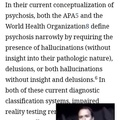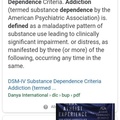Is religion an addiction?

Enjoy being online again!
Welcome to the community of good people who base their values on evidence and appreciate civil discourse - the social network you will enjoy.Create your free account
7 comments
Feel free to reply to any comment by clicking the "Reply" button.Anything that rules your life instead of enhancing it is an addiction. Not all people are addicted to religion. Depends on how far you take it.
To me, it is about 3 things:
- Ignorance
- Inability to think for yourself
- Fear of the unknown
These 3 things develop a mechanism inside you to deal with every difficulty in life with God - the unknown, invisible power that will help and rescue. I have seen, it is certainly not the lack of education. If you are able to deal with the 3 above, it is easy to see through how you held wrong beliefs.
But if you can not deal with the 3, you can call it an inability but not addiction.
I've wondered if it's a psychological condition. I think thats something we do in an attempt to explain things that don't make sense to us. Religion doesn't bare any of the classical symptoms os addiction or mental illness. I think, speaking from experience, when your given an idea very early in life and that idea is reenforced over and over by your family, community, and even media it's very difficult to conceive of that idea even being questionable. Consider flat earthers. I never learned more about the planet we live on than when someone challenged my belief about it. Now there is no evidence that the earth is flat, but until they came along, I never even considered it questionable. We need to constantly challenge our beliefs, paradigms, and world veiws to ensure that what we believe is actually true.
Just curious. Why is it you say religion has no classical symptoms of addiction or mental illness? I can think of several symptoms off the top of my head that fit both, and googled the list (for mental illness) to see several more that seem to fit many, many religious people.
@greyeyed123 According to the DSM, addiction is specific to substance abuse and also impairment. While some religions may employ substances in their rituals, religion doesn't necessitate it. Religious peple are also generally not impaired in their daily lives since religion is the only area where they suspend critical thinking.
The APA and WHO include hallucinations and disconnect with reality in their definition of psychosis. Religious people will claim to hear and see god, but when you question them further, you find out they don't mean it literally. And again, they only use this magical thinking when it comes to religion. I've included some screenshots. You're welcome to fact check me.
Where did you get your information from?
@greyeyed123 Lol sorry, I was watching the AXP while typing that.
@Sdusmith I think the DSM 5 includes "behavioral addictions", but gambling is apparently the only one listed at this point.
In terms of mental illness, the list of common signs of mental illness from NAMI (National Alliance of Mental Illness) include many that often overlap with religiosity (in my view).
Excessive worrying or fear
Confused thinking or problems concentrating and learning
Extreme mood changes, including uncontrollable “highs” or feelings of euphoria
Prolonged or strong feelings of irritability or anger
Difficulties understanding or relating to other people
Thinking about suicide
Difficulty perceiving reality (delusions or hallucinations, in which a person experiences and senses things that don't exist in objective reality)
Inability to perceive changes in one’s own feelings, behavior or personality (”lack of insight” or anosognosia)
I also think there are many instances where the magical thinking "only" in relation to religion is problematic, when they see their religion as all encompassing. Suicide bombers clearly apply magical thinking to their murder/suicides, but that clearly causes consequences outside their own minds. Would you consider all religiously motivated suicide bombers (or religiously motivated killers of any kind) to NOT be suffering from mental illness?
It seems what you are saying is the less serious the believer is about their religious beliefs, the more sane they are. I think I would agree, except the inverse is that the more serious they take their beliefs that cause irrational harm to themselves and others, the more religion looks exactly like a mental illness.
Enjoy being online again!
Welcome to the community of good people who base their values on evidence and appreciate civil discourse - the social network you will enjoy.Create your free account
Share this post
Categories
Agnostic does not evaluate or guarantee the accuracy of any content. Read full disclaimer.








